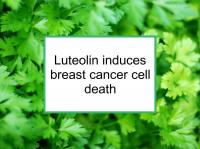A new study has described the mechanism of action by which the flavonoid luteolin induces breast cancer cell death. The most abundant food sources of luteolin are celery seed, Mexican oregano (Lippia graveolens), thyme and radicchio. Significant levels of luteolin are also found in parsley, hot peppers, artichokes, mint and sage.
Luteolin has been shown to exert anticancer activity in various types of human cancer cells. However, the underlying mechanisms are not well understood. In the study, luteolin was found to cause a decrease in breast cancer cell viability in a dose-dependent and time-dependent manner. Cell cycle measurements and staining demonstrated that luteolin induced programmed cell death (apoptosis).
In addition, luteolin was shown to induce activation of extracellular signal regulated kinase (ERK) and p38. This was confimed by the fact that pharmacological inhibition or knockdown of ERK and p38 was found to protect against luteolin-induced cell death. Further testing using immunocytochemistry demonstrated that luteolin triggers apoptosis-inducing factor (AIF) nuclear translocation, which in turn was mediated by activation of ERK and p38. This result was again supported by the fact that transfection of vector expressing microRNA of AIF prevented the luteolin-induced cell death. The authors conclude that luteolin induces a caspase-dependent and caspase-independent apoptosis involving AIF nuclear translocation mediated by activation of ERK and p38 in breast cancer cells.
Please see our article on how to optimize your breast cancer diet for information on what to eat during all stages of treatment and recovery.
